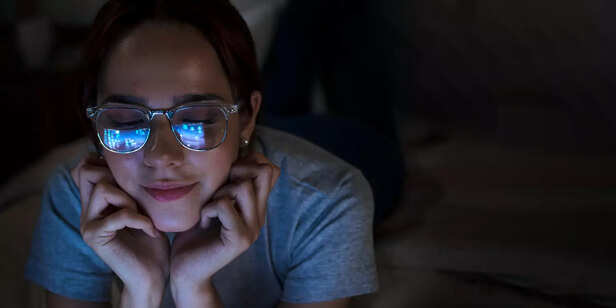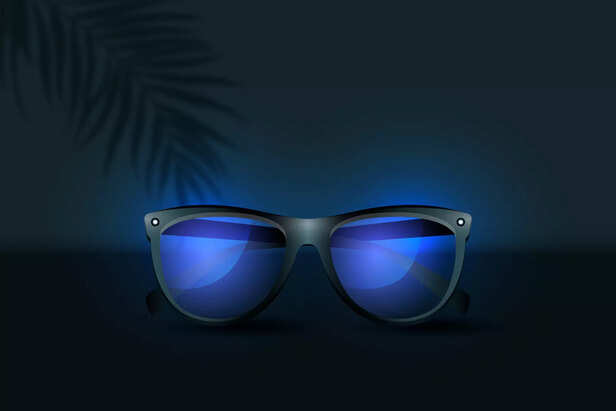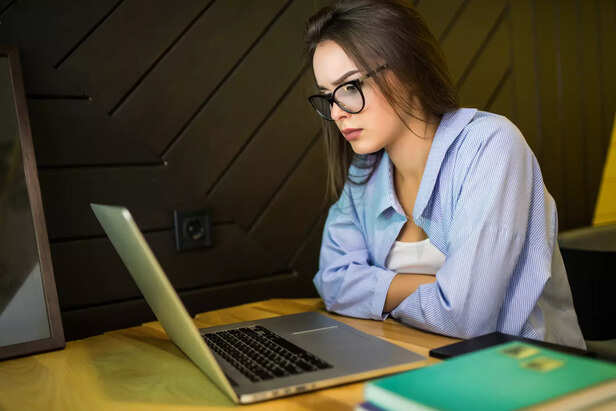Do UV Block Glasses Really Protect Your Eyes? Read This Before Buying Blue Light Glasses
Akanksha Tiwari | Thu, 05 Jun 2025
In today’s digital age, blue light blocking glasses have become a popular solution to screen-related eye strain, headaches, and sleep issues. If you want to protect your eyes from the effects of bright light, you should choose blue light blocking glasses. Every little bit counts when it comes to protecting your eyes. But are they scientifically effective or just another wellness trend? This article explores the science behind UV-block glasses, what experts say, and simple screen habits that might help more than any tinted lens.
( Image credit : Freepik )
Photo:
In this digital age, most for us spend hours staring at screens for work, communication or entertainment. this has lead to rise in complaints of eye strain, headaches, poor sleep quality and blurred vision. To deal with these problems, people have started using blue light blocking glasses, also known as UV block glasses. I know it’s really tempting from the consumer side of things that you buy this product, and it’s going to make you so much more comfortable throughout the work day. If you believe that glasses will prevent headaches, reduce eye strain and help you sleep like a baby. But do they work? OR are they just another tech- health gimmick? Firstly let's understand what is UV or blue light, why is it concern and the biggest question is how a glass blocks this light.

Blue light is part of the visible light spectrum, which the human eye can see. It has the shortest wavelength and the highest energy. About one-third of all visible light is considered blue light. Sunlight is the largest source of blue light. Artificial sources of blue light include fluorescent lights, LED TVs, computer monitors, smartphone and tablet screens. Unlike natural exposure to sunlight, screen time tends to be long, close to the eyes, and happens even at night. If sunlight also contains blue light then what difference does it make when it comes to screen time? and what is digital eye strain?
Looking at digital screens such as computers, smartphones and tablets for long periods of time requires repeated focusing and refocusing, which tires the ciliary muscles of the eyes. People blink less frequently when using digital devices, resulting in dry eyes and discomfort. In the scientific language this known as computer vision syndrome (CVS).

Blue light glasses that contain lenses specifically designed to reduce the amount of blue light that reaches the eye. These lenses filter blue light rays to help prevent them from entering your eye and causing potential damage. Many people misunderstand colored lenses as blue light glasses. The difference is not very obvious when seen with the naked eye. However, many people are unaware of what blue block glasses actually are and their significance. Blue light glasses also help to reduced digital eye strain, Improved focus during long screen hours and Better sleep if used at night. But the question remains, do these claims hold up and what does science say?
however, there is not enough researcher evidence to suggest or no scientifically- proven benefit of wearing that blue light blocking glasses for your eye. in many researcher highlighted that blue-light filtering lenses likely make no significant difference to eye strain, eye health, or sleep quality. In simple words the science doesn’t strongly support the claims. But Do People Still Feel the Difference,
yes Despite limited scientific proof, many users report feeling better after using these glasses. Placebo or not, they Help some reduce glare, May cut down screen brightness and especially in dim lighting. Could promote better sleep by reducing nighttime blue light So if you're experiencing discomfort, it might be worth trying, but results vary

After every 20 minutes of screen time, focus your gaze on an object 20 feet away for 20 seconds. This will give your eyes a much-needed break from close viewing and reduce eye strain.
Most phones and laptops now have a blue light filter or “night shift” mode. Use these, especially after sunset.
Set brightness and contrast to comfortable levels. Avoid glare and position screens slightly below eye level.
Blue light blocking glasses may help some users, especially those who have Work 8+ hours daily on screens or Use gadgets in low-light conditions. it also Struggle with sleep after screen time But for most, the better fix is not in buying glasses, it’s in changing your screen habits, taking regular breaks, and using built-in night modes. Before spending on these glasses, try simple changes. And if you continue to have issues, consult an eye care professional—they’ll help you find the best solution based on your unique needs.
Unlock insightful tips and inspiration on personal growth, productivity, and well-being. Stay motivated and updated with the latest at My Life XP.

Blue light glasses
( Image credit : Freepik )
What is or blue light?
Looking at digital screens such as computers, smartphones and tablets for long periods of time requires repeated focusing and refocusing, which tires the ciliary muscles of the eyes. People blink less frequently when using digital devices, resulting in dry eyes and discomfort. In the scientific language this known as computer vision syndrome (CVS).
What Are Blue Light Blocking Glasses?

Blue light glasses
Blue light glasses that contain lenses specifically designed to reduce the amount of blue light that reaches the eye. These lenses filter blue light rays to help prevent them from entering your eye and causing potential damage. Many people misunderstand colored lenses as blue light glasses. The difference is not very obvious when seen with the naked eye. However, many people are unaware of what blue block glasses actually are and their significance. Blue light glasses also help to reduced digital eye strain, Improved focus during long screen hours and Better sleep if used at night. But the question remains, do these claims hold up and what does science say?
The science behind light blocking glasses
yes Despite limited scientific proof, many users report feeling better after using these glasses. Placebo or not, they Help some reduce glare, May cut down screen brightness and especially in dim lighting. Could promote better sleep by reducing nighttime blue light So if you're experiencing discomfort, it might be worth trying, but results vary

Blue light glasses
( Image credit : Freepik )
Treatments & Preventive Measures
1.The 20-20-20 Rule
2. Enable Night Mode
3. Adjust Screen Settings
Blue light blocking glasses may help some users, especially those who have Work 8+ hours daily on screens or Use gadgets in low-light conditions. it also Struggle with sleep after screen time But for most, the better fix is not in buying glasses, it’s in changing your screen habits, taking regular breaks, and using built-in night modes. Before spending on these glasses, try simple changes. And if you continue to have issues, consult an eye care professional—they’ll help you find the best solution based on your unique needs.
Unlock insightful tips and inspiration on personal growth, productivity, and well-being. Stay motivated and updated with the latest at My Life XP.










